六年级下册lesson_20_Tomorrow_
科普版六年级英语下册lesson3_it_will_be_cold_tomorrow
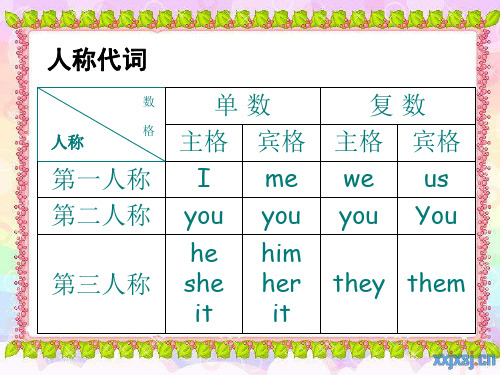
写出单词的相应形式
rain(形容词) rainy snow (形容词) snowy sun (形容词) sunny wind (形容词) windy raining rain(现在分词) won’t will not(缩写) love like(同义词)
/æ / /e/
Say what is the weather like tomorrow? It will be…
Say what is the weather like tomorrow ?
It will be…
Say what is the weather like tomorrow?
It will be…
I like summer . I like swimming .
我喜欢秋天。它是凉爽的。
I like autumn . It’s cool .
我喜欢冬天。我喜欢雪中漫步。
I like winter . It’s fun to walk in snow .
今天是个好天气,不是么?是的
It’s fine, isn’t it? Yes, it is.
sunny
cloudy
rainy
windy
snowy
What’s the weather like tomorrow?
It will be ….
sunny
cloudy
rainy
windy
snowy
Ask and answer: What’s the weather like in…? Beijing England
合拼练习
[æ ]
bat
bag pat tap cap cat dad pack back daddy
冀教版六年级下册英语Lesson14 Tomorrow We Will Play
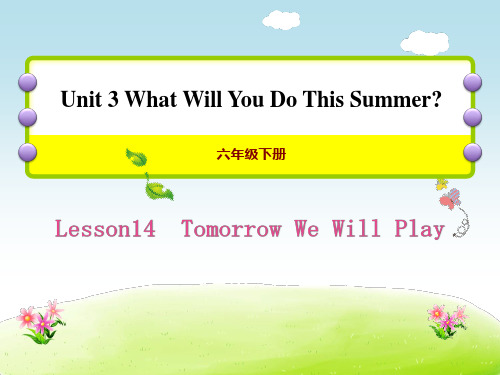
六年级下册
What will you do this weekend?
Danny: Tomorrow is Saturday. What will we do? Jenny: We will go to the park. We will fly a kite. Danny: I will not fly a kite! I will look at the
例句:I’m going to clean my bedroom tomorrow. 明天我打算打扫我的卧室。
考向 (2)由will构成的一般将来时的其他句式:
①否定句:主语+ won't (will not的缩写)+ 动词原 形 +其他.
例句:He won't play football with Jenny tomorrow. 明天他不和詹妮一起踢足球。
open the window close the window
知识点 3 Don’t be angry. 不要生气。 否定祈使句 否定祈使句有四种形式: (1) Don’t +行为动词原形+其他!
例句:Don’t close the door! 不要关门! (2) Don’t + be + 形容词+ 其他!
知识点1 We will go to the park. 我们将要去公园。
句型结构:主语+will +动词原形+其他. 例句:He will play football with Jenny tomorrow.
明天他将和詹妮一起踢足球。
考向(1)这是一个一般将来时的句子,表示在将来某一
时间将要发生的动作或存在的状态。 PPT模板:/moazai/ 资料下载:/ziliao/ 试卷下载:/shiti/ PPT论坛: 语文课件:/kejian/yuw en/ 英语课件:/kejian/ying yu/ 科学课件:/kejian/kexu e/ 化学课件:/kejian/huaxue/ 地理课件:/kejian/dili/
冀教版六年级英语下册 Lesson 14 Tomorrow We Will Play英文版
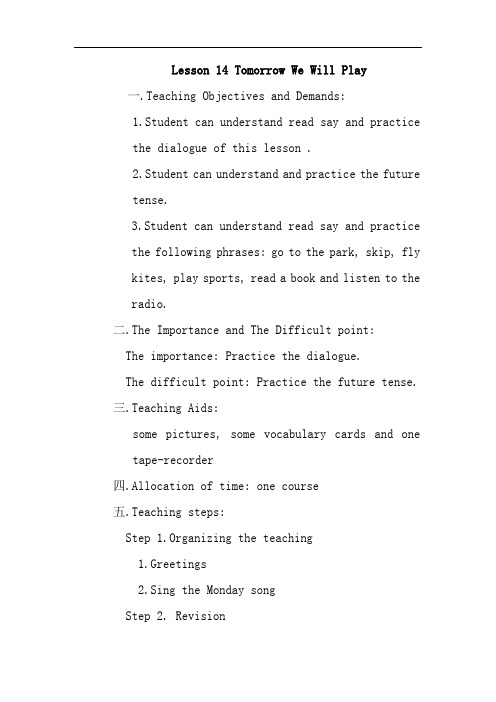
Lesson 14 Tomorrow We Will Play一.Teaching Objectives and Demands:1.Student can understand read say and practicethe dialogue of this lesson .2.Student can understand and practice the futuretense.3.Student can understand read say and practicethe following phrases: go to the park, skip, fly kites, play sports, read a book and listen to the radio.二.The Importance and The Difficult point:The importance: Practice the dialogue.The difficult point: Practice the future tense.三.Teaching Aids:some pictures, some vocabulary cards and one tape-recorder四.Allocation of time: one course五.Teaching steps:Step anizing the teaching1.Greetings2.Sing the Monday songStep 2. Revision1.Play “Simon says”to review action words (swim,jump, walk and run)2.Review locations and the structure “Let’s goto the _____ (location) to ___(verb) ___(noun).”with an object—prompt drill.Object phrasepot Let’s go to the kitchen to make supper.Soap Let’s go to the bathroom to wash hands. TV Let’s go to the living room to watch TV.Clothes Let’s go to the shop to buy ____.Book Let’s go to the library to red books. Step 3.Key concepts: will skip fly very park1.Introduce:a.The Ss have seen much of the key vocabularyin this lesson before, especially “fly kites”and “park”. When we introduce “park” and“fly”, ask the class to say “Let’s go tothe park to fly kites”.b.Demonstrate“skip”with skipping rope.Remember that the Ss mastered “skippingrope”.c.Demonstrate “very” by skipping fast andthen very fast as the teacher say the words.d.Here’s a way to introduce “will”. Explainthat will is another way to say “going to”.Ask the volunteers to draw lines to match the words.Yesterday today tomorrowWorked walk going to laughAte go going to seeLaughed jump going to eatJumped see going to jumpWent laugh going to walkSaw play going to goPlayed eat going to play2.Student book :Play the audiotape as the students follow along their books.3.Practice:Divide the class into small groups. Ask each group to make up a dialogue about going to the park tomorrow.六.Students’ activity:1.Sing the English song.2.Play “Simon says”.3.Practice “Let’s go to the ____(location)to ___(verb) _____(noun)”.4.Imitation.5.Group work to make up a dialogue.七.Blackboard:Lesson 14 Tomorrow We Will Play Fly a kite Go to the parkI’m going to ….I will ……。
六年级下册英语习题 Lesson 14 Tomorrow We Will Play 冀教版

C. Daming's Children's Day
B ( )2. Daming will go to ________ places in the
daytime.
A. one
B. two
C. three
A ( )3. Yesterday was ________.
A. May 30th
B. May 31st
the cycle of four seasons: spring, summer, 后再认真思考或向别人请教。
本次口语交际的话题是“我敬佩的一个人”,要求一是选择身边具有执著追求精神的人,通过具体事例表达敬佩之情;二是如果觉得人物的其他品质有可敬之处,也可以说一说。
autumn and winter. For example, a sunflower seed sprouts (发芽) from the ground in spring. The plant grows tall and blooms ( 开 花 ) in
3. What is she going to do?(同义句转换) What ______w_i_ll ______sh__e do? 4. He will play football in three days. (对画线部分提问) What ______w_i_ll he _____d_o__ in three days? 5. don't wet get I to want (. )(连词成句) ____I__d_o_n_'t__w_a_n_t_t_o__g_et__w_e_t_. __________________
六、阅读短文,选择正确的一项。 ____________
新冀教版六年级英语下册《Unit 1 Sports Lesson 6 A Famous Football Player》教案_22
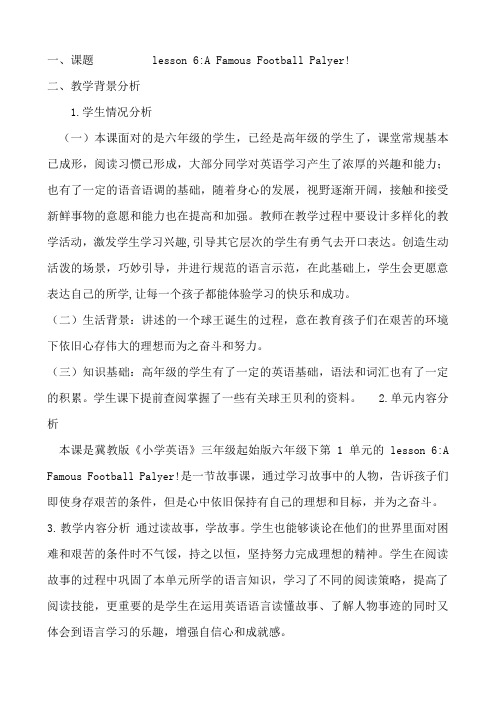
一、课题 lesson 6:A Famous Football Palyer!二、教学背景分析1.学生情况分析(一)本课面对的是六年级的学生,已经是高年级的学生了,课堂常规基本已成形,阅读习惯已形成,大部分同学对英语学习产生了浓厚的兴趣和能力;也有了一定的语音语调的基础,随着身心的发展,视野逐渐开阔,接触和接受新鲜事物的意愿和能力也在提高和加强。
教师在教学过程中要设计多样化的教学活动,激发学生学习兴趣,引导其它层次的学生有勇气去开口表达。
创造生动活泼的场景,巧妙引导,并进行规范的语言示范,在此基础上,学生会更愿意表达自己的所学,让每一个孩子都能体验学习的快乐和成功。
(二)生活背景:讲述的一个球王诞生的过程,意在教育孩子们在艰苦的环境下依旧心存伟大的理想而为之奋斗和努力。
(三)知识基础:高年级的学生有了一定的英语基础,语法和词汇也有了一定的积累。
学生课下提前查阅掌握了一些有关球王贝利的资料。
2.单元内容分析本课是冀教版《小学英语》三年级起始版六年级下第1单元的lesson 6:A Famous Football Palyer!是一节故事课,通过学习故事中的人物,告诉孩子们即使身存艰苦的条件,但是心中依旧保持有自己的理想和目标,并为之奋斗。
3.教学内容分析通过读故事,学故事。
学生也能够谈论在他们的世界里面对困难和艰苦的条件时不气馁,持之以恒,坚持努力完成理想的精神。
学生在阅读故事的过程中巩固了本单元所学的语言知识,学习了不同的阅读策略,提高了阅读技能,更重要的是学生在运用英语语言读懂故事、了解人物事迹的同时又体会到语言学习的乐趣,增强自信心和成就感。
三、教学目标分析1.知识与技能目标:(1)学生要听并理解一个简单的故事。
(2)学生会根据关键词的提示复述故事。
(3)学生能借助图片、板书等帮助,表演故事。
2.学习策略目标:(1)寻读、朗读、默读等阅读策略相结合,发展阅读策略;(2)增强小组合作意识,共同完成任务;(3)在教学过程中使用小组评价机制,培养学生的合作意识和自我调控能力。
最新精选冀教版小学六年级下册英语Unit 3 What Will You Do This SummerLesson 14 Tomorrow We Will Play复
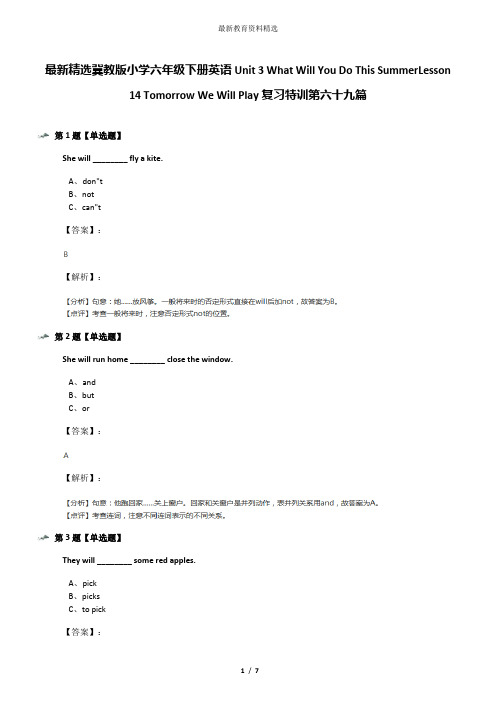
最新精选冀教版小学六年级下册英语Unit 3 What Will You Do This SummerLesson14 Tomorrow We Will Play复习特训第六十九篇第1题【单选题】She will ________ fly a kite.A、don"tB、notC、can"t【答案】:【解析】:第2题【单选题】She will run home ________ close the window.A、andB、butC、or【答案】:【解析】:第3题【单选题】They will ________ some red apples.A、pickB、picksC、to pick【答案】:【解析】:第4题【单选题】What ________ Danny do tomorrow?A、doesB、doC、will【答案】:【解析】:第5题【判断题】What will Lynn does tomorrow?A、正确B、错误【答案】:【解析】:第6题【判断题】She will picks some apples for her mother.A、正确B、错误【答案】:【解析】:第7题【判断题】My cousin like to sit in the sun.A、正确B、错误【答案】:【解析】:第8题【判断题】In winter, many trees don"t have any leaves.A、正确B、错误【答案】:【解析】:第9题【填空题】看图,写出英语单词。
________________________【答案】:【解析】:第10题【阅读理解】What will Tina do at 7: 00 a.m.? ______What will Judy do at 9: 00 a.m.?______What will Peter do at 5: 00 p.m.?______What will Tina and Judy do at 5: 00 p. m.?______【答案】:【解析】:第11题【句型转换】You can pick the flowers in the park. (变为否定句)You ______ ______ pick the flowers in the park.【答案】:【解析】:第12题【句型转换】Tomorrow I am going to play sports. (把主语换成we)Tomorrow ______ ______ ______ ______ play sports.【答案】:【解析】:第13题【句型转换】He will fly a kite next Saturday. (对画线部分提问)______ ______ he ______ next Saturday? 【答案】:【解析】:第14题【句型转换】What are you going to do? (同义句转换)What ______ you ______?【答案】:【解析】:第15题【选词填空(词汇运用)】The boy will not pick any pears ______ his mother.I run home ______my friends.Li Ming will look ______the clouds.We will go on a trip ______week.You can"t pick the flowers ______the park.【答案】:【解析】:。
六年级下册英语教案-Unit3Lesson14TomorrowWeWillPlly|冀教版三起
冀教版小学英语第八册Lesson 14 Tomorrow we will play教学设计教学理念:新课标理念强调激发和培养学生学习英语的兴趣,帮助他们建立学习的成就感和自信心,发展自主学习的能力。
在掌握英语基础知识的过程中,培养他们的观察、记忆、思维、想象能力和创新能力。
同时教学设计要符合学生的生理和心理特点,遵循语言学习的规律,注意引导学生运用观察、发现、归纳和实践等多种方法,学习语言知识,感悟语言功能。
教学分析:(一)教材分析:本课Lesson 14 Tomorrow we will play 是冀教版小学英语第八册第三单元的一课,本单元Li Ming、Jenny和Danny尽情享受夏季的各种活动,并且讨论他们的暑期计划,同时本单元还学习will结构的一般将来时。
本课主要是新授will结构的一般将来时并使学生能简单运用该时态进行表达。
(二)学生分析:通过前几课的学习学生已经能够描述夏天的活动,此时学习用一般将来时表达各种活动和计划降低了学习难度,而且学生对夏天充满期待,乐于进行表达。
同时该年级学生已经初步具有了一定的语言提炼、归纳和总结能力,但还有待提高和加强。
教学目标:(一)知识目标:1、通过本课的学习,使学生掌握(读、写、说出并且听懂)下列词汇:will , skip, fly, very, park.2、使学生了解will结构的一般将来时,能用will对be going to进行替换并能用这种时态进行简单表达。
3、拓展学生了解will引导的一般疑问句及其回答Yes, I will. No, I won’t.(二)能力目标:1、培养学生能通过感知,模仿进而归纳will引导的一般将来时的语法现象并能进行简单的应用表达。
2、通过多种课堂活动培养学生综合语言运用能力。
引导学生通过实践,合作等学习方式,培养合作学习的意识,提高与他人交往的能力。
(三)情感目标:1、调动学生学习的积极性,使学生在不断体验成功的同时,增强英语学习的信心。
2020春六年级英语下册Unit3WhatWillYouDoThisSummerLesson14TomorrowWeWillPlay习题冀教版(三起)
Lesson14 Tomorrow We Will Play 一、看图,写单词。
1. 2. 3. 4. ________ ________ ________ ________ 二、选择正确答案。 ( ) 1. What ________ Danny do tomorrow? A. does B. do C. will ( ) 2. They will ________ some red apples. A. pick B. picks C. to pick ( ) 3. She will ________ fly a kite. A. don’t B. not C. can’t ( ) 4. Don’t ________ afraid. A. is B. are C. be ( ) 5. She will run home ________ close the window. A. and B. but C. or 三、按要求完成下列各题。 1. Tomorrow I am going to play sports. (把主语换成we) Tomorrow ________ ________ ________ ________ play sports. 2. I will eat breakfast. (变为否定句) I ________ ________ eat breakfast. 3. What are you going to do? (同义句转换) What ________ you ________? 4. He will fly a kite next Saturday. (对画线部分提问) ________ ________ he ________ next Saturday? 5. You can pick the flowers in the park. (变为否定句) You ________ ________ pick the flowers in the park. 6. I am going to visit my grandma tomorrow .(改为同义句)
冀教版三起英语六年级下册Unit 4 Lesson 21 A Party for Li Ming课件
Okay! I will invite some friends.
聚会;晚会
They will have a good-bye party for Li Ming.
leaving 的用法
leaving 是动词leave的现在分词形式,它可以用 在一个现在进行时的句子中表示将来,意思是 “将要出发,将要离开 ”。 类似用法的词有:arrive, go, get, come等。
It’s five forty-five. He’s _l_a_t_e_.
Let’s make
Make an invitation card and talk about it.
Tip: The information should include what, when and
where.
Summary
例句:他们很快就会到这里了。 They’re arriving here soon.
Read and answer
1. Will they tell Li Ming about the party? No, they won’t. It’s a surprise for him.
告诉; 讲述
Will we tell Li Ming about the party?
Then I will be early! Jenny: Great! See you tomorrow!
How many people are coming to the party, Jenny?
Let’s see…you, me, Li Ming, Steven, Kim, my sister, Mr. wood, my mum an(d) my dad. Nine!
六年级下册一课一练Unit3Lesson14TomorrowWeWillPlay冀教版含答案
lesson14 一课一练学校: 班级: 姓名: 学号:一、单选题(共5 小题)1.[容易] What Danny do tomorrow?()A.does B.do C.will2.[容易] She will run home clo s e the window.()A.and B.but C.or3.[容易] They will s ome red appl es.()A.pick B.picks C.to pick4.[容易] Do n't afraid.()A.is B.are C.be5.[较易] She will fly a kite.()A.don't B.not C.can't二、填空题(共4 小题)6. [较易] 单词连线.(1)pick a.下雨的,多雨的(2)close b.节日;节期(3)rainy c.关;结束;关闭(4)wrong d.采,摘(5)festival e.错误的,不正确的;不好的7. [容易] 把下面的句子翻译成中文意思.What will we do tomorrow??8. [容易] 把下面的句子翻译成中文意思.I will pick some flowers for my mother!!9. [较易] 把下面的句子翻译成中文意思.It will be hot soon.I need a fan..三、连词成句(共5 小题)10.[容易] be,don't,angry.11.[容易] it,I,not,do,will12.[较易] flowers,you,the,pick ,the,in,park,can't13.[较易] look,I,will,at,the,the,beautiful,in,park,flowers14. [较易] 对话连线:(1)What will we do tomorrow?a.Danny! You can't pick the flowers in thepark.(2)I will pick some flowers for my mother! b.Sorry.Don't be angry.I will not do it.(3)Danny,that's wrong.c.we will go to the park.(4)It's rainy.d.It will be hot soon.I need a fan.(5)Summer is coming.e.I will not go to the zoo today.I don't wantto get wet.四、判断题(共10 小题)15.[容易] I will pick some flowers to my mother! (判断对错)16.[容易] Danny! You can't pick the flowers at the park.(判断对错)17.[容易] My cousin like to sit in the sun.(判断对错)18.[容易] What will Lynn does tomorrow?(判断对错)19.[容易] It's rainy.I will not go to the park to fly a kite.(判断对错)20.[容易] She will picks some apples for her mother.(判断对错)21. [较易] 判断下列句子正误.What will we do tomorrow?(判断对错)22. [较易] 判断下列句子是否正确,对的在括号中写T ,错的写F.In winter,many trees don't have any leaves.23.[容易] It will be hot soon.I need a fan.(判断对错)24.[容易] Sorry.Don't be angry.I will not do it.(判断对错)五、阅读理解(共1 小题)25. [较易] 阅读短文,完成表格.Tomorrow is June the first,Children's Day.David will have a happy holiday.In the morning,he will go to the park and take pictures with his friends.In the afternoon,he will play computer games with his brother and go shopping with his parents.In the evening,he will watch TV and help his mother make dinner.He will have a good time.What will he do?In the morning In the afternoon In the evening go to the park (1)(2)(3)go shopping with his parents (4)lesson14 一课一练参考答案一、单选题(共5 小题)1.【分析】Danny 明天要去做什么?【解答】本题考查一般将来时,tomorrow 意思为:明天,说明句子时态是一般将来时.A 选项does 用在一般现在时中;B 选项do 也是用在一般现在时中;C 选项will 用在一般将来时态中.故选:C.【点评】结合句中关键词,判断句子时态,由时态再判断助动词.【知识点】一般将来时2.【分析】她会跑回家并关上窗户.【解答】考查连词.A.and 和、并且,通常用于肯定句.B.but 但是,表示转折.C.or 或者、还是,通常用于否定句或一般疑问句.原句是肯定句,C 不正确.结合语境"她会跑回家关上窗户."可知,表示递进关系,用and"并且".B 不正确.故选:A.【点评】连词可以表并列、承接、转折、因果、选择、假设、比较、让步等关系,要结合语境,选择合适连词用法.【知识点】连词辨析3.【分析】他们将会摘一些红苹果.【解答】考查动词原形.A.pick 摘,动词原形.B.picks 第三人称单数.C.to pick 不定式.根据will 情态动词可知,后需用动词原形,所以用pick.故选:A.【点评】考查动词原形.情态动词后的谓语动词通常用原形.分析选项,找到关键词,选择合适答案.【知识点】动词原形4.【分析】不要害怕.【解答】考查动词原形.A.is 是,单数.B.are 是,复数.C.be 是,原形.原句是否定句祈使句,通常用Don't 开头,后跟be 动词原形be.故选:C.【点评】考查动词原形.掌握否定祈使句Don't 后用动词原形或be 动词原形的知识点,选择合适答案.【知识点】动词原形5.【分析】她将不会放风筝.【解答】考查否定句.A.don't 不,助动词.B.not 不.C.can't 不能,情态动词.根据will 可知,含有情态动词will,变否定句在will 后加not.故选:B.【点评】考查否定句.含有情态动词will,变否定句直接在情态动词will 后加not.结合语境,分析选项,选择合适答案.【知识点】否定句二、填空题(共4 小题)6.【分析】(1)﹣d.pick 译为:采,摘.(2)﹣c.close 译为:关;结束;关闭.(3)﹣a.rainy 译为:下雨的,多雨的.(4)﹣e.wrong 译为:错误的,不正确的;不好.(5)﹣b.festival 译为:节日;节期.【解答】考查单词翻译.(1)d.pick 译为:采,摘.故选:d.(2)c.close 译为:关;结束;关闭.故选:c.(3)a.rainy 译为:下雨的,多雨的.故选:a.(4)e.wrong 译为:错误的,不正确的;不好.故选:e.(5)b.festival 译为:节日;节期.故选:b.【点评】熟记教材单词,并且灵活运用.【知识点】单词翻译7.【分析】我们明天做些什么?【解答】本题主要考查英译汉.what 意为:什么;will 意为:将要;we 意为:我们;do 意为:做,tomorrow 意为:明天.结合句意与中文的表达习惯作答.故答案为:我们明天做些什么?【点评】做英译汉的题目,首先要熟练掌握一定的词汇,平时记忆单词很重要.【知识点】英译汉8.【分析】我要采些花给我的妈妈!【解答】本题主要考查英译汉.I 意为:我;will 意为:将要;pick some flowers 意为:采摘一些花;for 意为:为;my mother 意为:我的妈妈.结合整句句意与中文的表达习惯作答.故答案为:我要采些花给我的妈妈!【点评】做英译汉的题目,首先要熟练掌握一定的词汇,平时记忆单词很重要.【知识点】英译汉9.【分析】天气会变得很热.我需要一个扇子.【解答】本题主要考查英译汉.It will be 意为:它将会变得;hot 意为:炎热的;soon 意为:很快;I 意为:我;need 意为:需要;a fan 意为:一把扇子.结合整句与中文的表达习惯作答.故答案为:天气会变得很热.我需要一个扇子.【点评】做英译汉的题目,首先要熟练掌握一定的词汇,平时记忆单词很重要.【知识点】英译汉三、连词成句(共5 小题)10.【分析】不要生气.【解答】考查连词成句.这是一个否定祈使句.Don't 开头.后跟be 动词原形be.最后是形容词angry"生气的".故答案为:Don't be angry.【点评】此题知识点是考查连词成句.首先要判断句式,然后选择相应的主语、谓语、宾语等结构.再考虑一些固定搭配等,注意不要少词.【知识点】连词成句11.【分析】我不会做的.【解答】考查连词成句.这是一个否定句.主语I"我".否定句,在情态动词will 后加not.谓语动词用原形do"做".宾语it"它".故答案为:I will not do it.【点评】考查连词成句,首先看标点符号,粗略地看看词,把固定搭配放在一起.根据句子意思再细致地连.检查词数,单词拼写是否有误,主要是抓住核心短语,主语,谓语等.【知识点】连词成句【解答】考查连词成句.这是一个否定句.主语You"你".情态动词can't"不能"后跟动词原形pick"摘".定冠词the 修饰名词flowers"花"做宾语.in the park"在公园里"状语.故答案为:You can't pick the flowers in the park!【点评】考查连词成句,首先看标点符号,粗略地看看词,把固定搭配放在一起.根据句子意思再细致地连.检查词数,单词拼写是否有误,主要是抓住核心短语,主语,谓语等.【知识点】连词成句13.【分析】我将要看公园里美丽的花.【解答】考查连词成句.这是一个陈述句.主语I"我".情态动词will 后谓语动词用原形look.look at"看".定冠词the 和形容词beautiful"美丽的"修饰名词flowers"花".定冠词放在前面.in the park"在公园里"状语.故答案为:I will look at the beautiful flowers in the park.【点评】此题知识点是考查连词成句.首先要判断句式,然后选择相应的主语、谓语、宾语等结构.再考虑一些固定搭配等,注意不要少词.【知识点】连词成句14.【分析】(1)﹣c.我们明天会干什么?我们会去公园.(2)﹣a.丹尼,我要为我妈妈摘一些花.你不能在公园里摘花.(3)﹣b.丹尼,那是错的.对不起,不要生气,我不会那样做了.(4)﹣e.天在下雨.我今天不去动物园了.我不想被淋湿.(5)﹣d.夏天就要来了.天气马上就要热了.我需要一个风扇.【解答】1.c.询问做什么.What will we do tomorrow?我们明天会干什么?主语是we,故答语也要用we,我们会去公园.故选:c2.a.考察日常交际用语.主人公要在公园摘花,答者制止他,不能做某事,用can‘t+动词原形.故选:a3.b.考察日常交际用语.评价别人做得不对,答语要勇于承认错误.故选:b4.e.考察日常交际用语.交流外面天气,下雨会被淋湿.故选:e5.d.考察日常交际用语.Summer is coming.夏天就要来了.根据常识,天气会变热.故选:d【点评】对话搭配主要是考查对日常交际用语的掌握和使用能力.平时积累常用的交际用语,理解句子意思,即可作答.【知识点】对话搭配四、判断题(共10 小题)【解答】本题考查句子改错.根据我要为我妈妈摘些花.为…要用介词for.故答案为:×.【点评】句子改错,要仔细分析句子结构,根据语法知识进行分析,按要求改写句子.【知识点】句子改错16.【分析】Danny!你不能在公园里采花.【解答】本题考查句子改错.根据Danny!你不能在公园里采花.在公园里要用in thepark.故答案为:×.【点评】句子改错,要仔细分析句子结构,根据语法知识进行分析,按要求改写句子.【知识点】句子改错17.【分析】我表哥喜欢坐在阳光下.【解答】考查判断.主语cousin 第三人称单数,一般现在时态,谓语动词用like 的第三人称单数likes"喜欢".故答案为:×.【点评】考查判断,分析时态、主语单复数变化,找到关键词,正确做出判断.【知识点】句子改错18.【分析】Lynn 明天将做什么?【解答】考查判断.根据What will…?可知,含有情态动词will 的特殊疑问句,谓语动词用原形do"做".不用第三人称单数does,因此不正确.故答案为:×.【点评】考查判断,掌握含有情态动词的特殊疑问句谓语动词用原形的知识点,找到关键词,做出判断.【知识点】句子改错19.【分析】下雨了,我不会去公园放风筝的.【解答】考查句子改错.题干表达"下雨了,我不会去公园放风筝的".句子描述没错.故答案为:√【点评】句子改错,要仔细分析句子结构,根据语法知识进行分析,按要求改写句子.【知识点】句子改错20.【分析】她会给她妈妈摘一些苹果.【解答】考查判断.根据will 可知,情态动词后谓语动词用原形pick"摘".不用第三人称单数picks.故答案为:×.【点评】考查判断,分析时态、主语单复数变化,找到关键词,正确做出判断.【知识点】句子改错21.【分析】我们明天将要做什么?【解答】考查判断对错.句子中"will"表示"将要",句子时态是一般将来时,后面跟动词原形,"tomorrow"表示"明天",将来时间,句子表达没有错误.故答案为:√.【点评】考查判断对错,要求熟悉课本所学,掌握句义,结合语法知识,确定句子结构,按要求分析句子正误,完成题目.【知识点】句子改错22.【分析】在冬天,许多树都没有叶子.【解答】该题考查英文常识.In winter 译为:在冬天;leaves 译为:树叶;In winter,many trees don't have any leaves.译为:在冬天,许多树都没有叶子.根据常识,是正确的.故答案为:T.【点评】注意积累日常生活中的常识.【知识点】英文常识23.【分析】很快就要热了,我需要一个风扇.【解答】本题考查句子改错.根据It will be hot soon.I need a fan.没有错误.故答案为:√.【点评】句子改错,要仔细分析句子结构,根据语法知识进行分析,按要求改写句子.【知识点】句子改错24.【分析】对不起,别生气.我不做了.【解答】本题考查句子改错.根据Sorry.Don't be angry.I will not do it.没有错误.故答案为:√.【点评】句子改错,要仔细分析句子结构,根据语法知识进行分析,按要求改写句子.【知识点】句子改错五、阅读理解(共1 小题)25.【分析】明天是六月一日,儿童节.大卫将会度过一个很快乐的节日.在早上,他会去公园并且和朋友拍照片.下午,他会和弟弟打电脑游戏并且和他的父母去购物.在晚上,他会看电视并且帮助妈妈准备晚饭.他会玩得很开心.【解答】本题考查细节阅读填空.(1)由题,In the afternoon,he will play computer games with his brother and go shopping withhis parents.所以下午,首先他会play computer games with his brother.(2)由题,In the evening,he will watch TV and help his mother make dinner.所以晚上,首先他会watch TV.(3)由题,In the morning,he will go to the park and take pictures with his friends.所以早上,他还会take pictures with his friends.(4)由题,In the evening,he will watch TV and help his mother make dinner.所以晚上,他还会help his mother make dinner.故答案为:【点评】仔细阅读文章,找出与问题相关的细节,填空作答.【知识点】阅读填空。
- 1、下载文档前请自行甄别文档内容的完整性,平台不提供额外的编辑、内容补充、找答案等附加服务。
- 2、"仅部分预览"的文档,不可在线预览部分如存在完整性等问题,可反馈申请退款(可完整预览的文档不适用该条件!)。
- 3、如文档侵犯您的权益,请联系客服反馈,我们会尽快为您处理(人工客服工作时间:9:00-18:30)。
二,有will的陈述句变为一般疑问句:
1.I will wake up.我将要起床。(一般疑问句)
Will you wake up?你将要起床吗? 2.I will play sports.我将要做运动。(一般疑 问句) Will you play sports ?你将要做运动吗?
返回
1.句中有will 变为一般疑问句规则: (1)先把will 换到句子最前面,首字母要大写; (2)第一人称 I ,变为you.
new stensences: be going to
Tomorrow I am going to wake up at 7:00. I am going to eat breakfast at 7:15. I am going to drive my car to school. I am going to teach English. Everyone is going to learn English.
谢谢,下次再见!
will
Tomorrow I will wake up at 7:00. I will eat breakfast at 7:15 . I will drive my car to school. I will teach English. Everyone will learn English. 返回
一.句型转换。 1.I will fiy a kite .(变为一般疑问句 ) fly ___you ___ a kite? Will 2.I will play sports.(变为一般疑问句 ) Will you ___ ___ play sports? 3.He is going to wake up at 6:00. (同义句) Will He _____ wake up at 6:00. 4.we are going to skip.(同义句) Will we_____ skip. 5.Danny will read a book.(改为否定句) Danny Will ___ read a book. ___ not
New words:
tomorrow 明天 will 将,会 skip 跳,蹦 park 公园 drive 驾驶 pick 摘,采 very 很,非常 beautiful 漂亮的 our 我们的 we(形物代)our faster 更快的 fast(比较级)faster
new stensences: be going to
will
Tomorrow I will wake up at 7:00. I will eat breakfast at 7:15 . I will drive my car to school. I will teach English. Everyone will learn English. 返回
2.Will you ... .... ? 肯定回答:yes, I will . 否定回答: No, I will not .
We will skip. (否定句)
We will not skip
I will fly a kite.
(否定句)
I will not fly a kite.
返回
Prasticing:
一,短语互译
1. play sports 2. pick the flowers 3. learn English 4.go to the park 5.fly a kite 6.eat breakfast 7.listen to the radio
A.摘花 B. 听收音机
C. 去公园
D. 进行体育运动 E. 学英语 F. 吃早饭 G. 放风筝
二.选择题。 (A)1.I like to ____. A.skip B. skiping C.skips (A)2.she likes to___ shorts and sandals. A.wear B. wearing C.wears (B)3.Danny ____ takes off his sandals. A.slow B.slowly C.slowlys (C )4.She is going to ___to BeiJing next sunday. A.going B. went C. go (B)5.we are going to ____sports . A.playing B.play C. plays
Review last lesson:
一.按要求写出单词。 snowy swimming 1.snow(形容词)_____ 2.swim(现在分词)_____ leaves cold 3.leaf(复数) ______ 4.hot (反义词)______ lying where 5.lie(现在分词) ______ 6. wear(同音词)______ can not don't 7.can't (全写形式)______ 8.do not(缩写)_____
学 习 目 标
1、 掌握并能读、写本节课所有短 语。 2、学习一般将来时的两种表达 (“be going to” and “will ”) 3、掌握贴近现实生活的语 境中正确地运用所学的用语进行对话, 以达到“学习活动化,活动交际化” 的目的。
Tomorrow I am going to wake up at 7:00. I am going to eat breakfast at 7:15. I am going to drive my car to school. I am going to teach English. Everyone is going to learn English.
• • • • • • • • •
wake up 醒来 eat breakfast 吃早饭 drive my car 开车 teach English 教英语 learn English 学英语 play sports 做运动 read a book 看书 help your mother 帮助妈妈 listen to the radio 听收音机
一.be going to and will 将要和将会
I am going to eat breakfast at 7:15.
I
will
eat breakfast at 7:15.
Everyone is going to learn English !
Everyone will learn English ! be going to = will
结构:be going to+ 动词. 原形= will + 动词. 原形
He is going to eat breakfast.
He will eat breakfast. She is going to wake up. She will wake up.
We are going to play basketball. We will play basketball.
